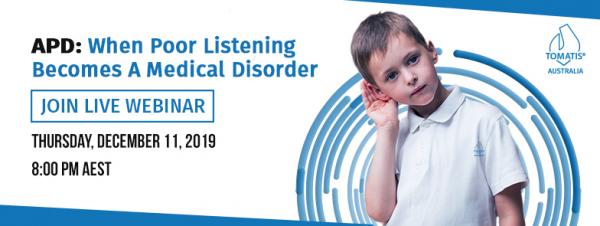
-- Its presentation aims to increase awareness of Auditory Processing Disorder.
In another free webinar, Tomatis® Australia will be presenting the deeper science behind poor listening skills (and why the causes is not purely psychological)..
Traditionally, it has been widely believed that poor listening can be attributed to poor attitudes towards focus, study, work and other behavioural problems. Recent research, however, has gradually suggested that impaired cognitive functions could be the primary cause (even in cases of individuals with brains that would otherwise be considered as normally functioning). The result is that the classification of a new cognitive disorder.
Known as Auditory Processing Disorder (APD), the Tomatis® organisation has spent a considerable amount of research specifically aimed at understanding listening difficulty on a neurological level.
The result has had a tremendous impact on research in other fields of study, such as those for autism, ADHD, learning disabilities and more. A lot of the research into APD has strongly suggested that the brain’s executive function (which is responsible for problem solving, adaptive thinking and motor skills) is also being used on social conversations.
Unfortunately, it is still widely believed that listening difficulty is equivalent to bad manners and poor conduct on the part of the listener. Through its work on APD, Tomatis® seeks to look for another possible explanation that doesn’t default to blaming behaviour.
And much like the previous webinar, the presentation will be by French-Australian psychologist Francoise Nicoloff, who also serves as the head of Tomatis® Australia. Her usual Q&A will also follow, and attendees will be able to see hard data procured straight from listening tests that she herself had conducted
Attendees will also be receiving a free copy of The Listening Journey, an in-depth guide to Tomatis® research into APD and how they have applied their findings to design sound-based intervention programs aimed at addressing different kinds of neurodiverse conditions.
Release ID: 88938933

